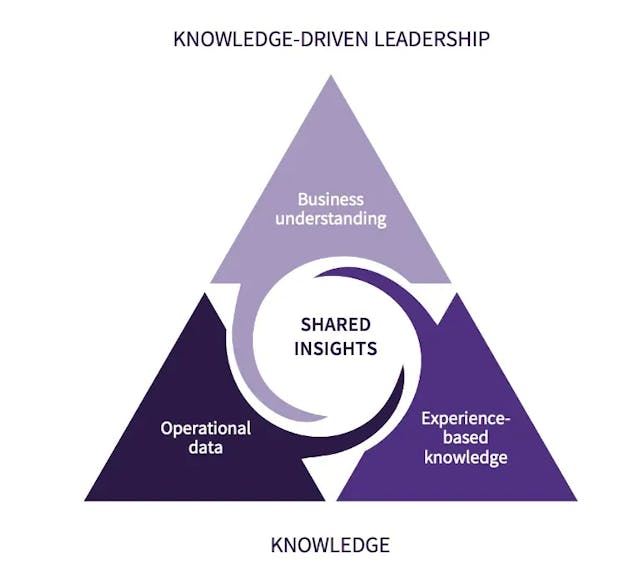Knowledge adds impact to decision-making, but one needs to be mindful of its application. The fact that today there is an endless amount of data available for any given decision, is a double-edged sword. If this data cannot be properly filtered and turned into relevant information, data can work against quality decision making instead of offering tangible advise for business development. More turns out to be less.
“Leadership should be made as simple as possible”, Pekka Vuorela, CEO of Innolink Group elaborates. “For that to happen, it is necessary to recognize what data and insight are relevant for this particular organization, at this particular time.”
Knowledge-based management can revolutionize the way a company invests in future growth. Combining the NPS targets with commercial growth targets, the focus will be placed sharply on creating customer satisfaction that has commercial relevance.
“If a company wants to be successful it must actively seek data driven insights for growth."
This kind of an approach can be scaled to cover all the environments the company operates in, taking country-specific market variables into account but focusing every activity to what matters the most: profitable growth.
Challenging your viewpoints
While operative data from CRM, ERP, and such systems, tell us precisely what has taken place, it is not capable of offering reasoning in support of decision making. Utility of the data must be analyzed with a human viewpoint, seamlessly and in real time.
A common pitfall at this point is building the analysis solely on experience from the industry in which the company operates. More beneficial insights can often be found from professionals who possess a wider perspective – like experience with similar situations in different business areas.
“If a company aims to become a market leader, it should seek lessons from outside its core business,” Vuorela explains. “Break-through insights are often found in places where others have not thought to look.” Yet benefits are evident also for internal process development - as companies begin analyzing their operations and gathering data for improving them, combining outside experience with in-house substance is often the best way to ensure all viewpoints have been covered.
“A one-time survey to what has happened does not help, if the connection to business potential is missing”, Vuorela adds. “That is why no market or customer research should be carried out without both strategic business understanding and operational data to back it up.”
Customer experience, and its strong impact on business
Everyone speaks of customer experience, even makes efforts to improve it. But how many actually go beyond that, to the commercial impacts like reduced churn, better market position, boosted revenue, lowered cost to serve, increasing customer loyalty, up-selling, cross-selling and increased owner value?
Customer experience is a buzzword that is usually brought up as every business developer’s top priority – especially now as companies are outright begging for answers to help them find their way back to path of growth.

Every company’s success depends on its ability to get new customers, as well as maintaining the existing relationships in a way that keeps the customers satisfied. However, as companies often lack the adequate tools for well-organized knowledge management, even significant efforts to maintain those relationships often fail to transform into efficient growth.
Growth through customer relationships requires systematic nurturing models. For most companies even thinking and talking about the differences in conversion rates might be important when it comes to creating functioning sales pipelines for current and new customers. Additionally, deep diving into data from specific stages of your sales pipeline, provides a valuable way to anticipate tomorrows purchase behavior. Knowledge-based management that focuses on the various stages of the sales pipeline, and develops engagement in these, helps boost conversion rates. Yet even data assisted, sales is a challenging field which requires professionals with appropriate skills and abilities.
“Good farmers are not necessarily ideal hunters, as those two tasks are deep down quite different”, Pekka Vuorela points out. “The company must understand what kind of patterns work in various situations and decide on the resourcing accordingly.”
Matching customer experience targets with potential growth
Those who want to be market frontrunners want a thorough grasp on all the stages of customer path – both to minimize churn and to find viable sources for growth. “While holding on to the existing customer base requires less effort with the right instruments, if a company wants to be successful tomorrow it must also pay attention to actively seeking new sources of growth”, Pekka Vuorela emphasizes. ”Knowledge-based management helps you succeed on both fronts.”
Organizations and people who are wrestling with these issues would do well to approach knowledge-based customer processes not as an expenditure, but as an investment for company’s commercial impact. The big picture should be about investing resources in a way that brings in the best growth and profitability. Knowledge-based management should be approached with the same kind of target setting and return expectation as any other investment, with measurable growth and commercial impact being the key drivers to evaluate.
